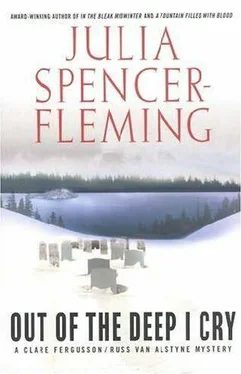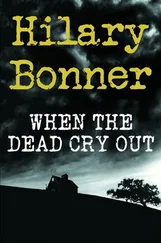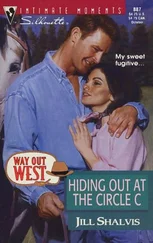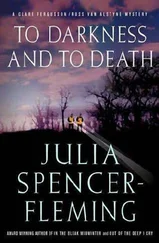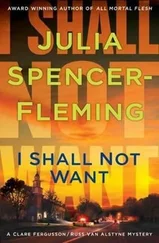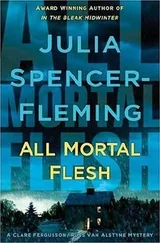“I sure hope you won’t be as careless as that when you’re working here.” She stepped out into the hall and beckoned him to follow. “We don’t have much of a budget and we have to stretch the supplies as far as we can.”
“Yes,” he said, trailing after her. “I mean, no, I’m usually not that clumsy. I was-” Scared.
“Jane?” On the stairs below the landing, he could see the old lady who had been working the reception desk. “Are you ready?” She was untying her striped apron. “I’d stay longer, but I promised my daughter I’d watch her girls this afternoon.”
“Sorry, Ruth,” Mrs. Ketchem said. The other woman passed her the apron, and Mrs. Ketchem tied it on over her dress. The starched sweetness of the blue and white stripes seemed to cast Mrs. Ketchem in a deeper darkness, like a witch wearing an angel’s robe. “I didn’t mean to keep you over,” she was saying as they all three descended the stairs.
Allan looked with longing at the door as the morning’s volunteer receptionist let herself out, but Mrs. Ketchem had cast a spell over his shoes-or perhaps they, more than his head, knew how much he wanted to become a doctor-and he found himself following her into the parlor turned office.
“It’ll be up to you to see you get accepted into medical school and that you keep your grades up. If you drop out or flunk out, I’ll be after you to repay the money I’ve spent. You or some other, I’m going to find someone to help me establish this clinic so that it can’t get knocked down.” Mrs. Ketchem enthroned herself on the desk chair and swiveled toward him. Across the desk, he could see the patients waiting for their turn with today’s doctor. These people would become his responsibility. This clinic would become his responsibility. For seven years . “I don’t mind telling you, I’m hoping that if you take the job on, you’ll want to stay even after your term is over.” A hint of the woman upstairs, the woman of the terrible story, rose in her eyes. “I need someone who believes in this place like I do. To keep it going in perpetuity after I’ve died. That’s the word my lawyer used when I gave over my in-laws’ dairy farm to the town. ‘To be used in perpetuity for the benefit of the clinic.’ I like that.”
The language reminded Allan of the way Roman Catholics paid to have masses sung for the souls of the dead. In perpetuity.
“Well?”
“What?” he asked, feeling that she had caught out his secret thoughts again. “Do we have a deal?”
He thought of the upstairs room, the glass shattering, the rising and falling of her voice. He thought of his dad’s face when he came home and told them the mill was closing down. For good. He thought of his own name, Allan G. Rouse. M.D. Then the bratty boy in the waiting room coughed, hard, whining his misery, and he thought suddenly of four small coffins.
“Yes,” he said. “We have a deal.”
NOW
Tuesday, March 28
Russ couldn’t settle on the worst part of having a broken leg. Was it being driven around town like a kid too young for a permit? Or struggling along sidewalks slick with muddy water and the last remnants of crumbling ice, praying he wasn’t going to fall on his ass? He had plenty of time to contemplate both while humping himself up the South Street sidewalk toward the free clinic.
He hadn’t started out the day in the best of moods, and the rapidly falling barometer didn’t help. His leg registered every change in the pressure with a new ache or twinge. The search at Debba Clow’s home yesterday had turned up a big fat nothing, and he was getting that feeling, the one he hated, of chasing his own tail.
“Isn’t this a great day, Chief?” Officer Kevin Flynn feinted side to side across the walk and up and down the stairs, dribbling and shooting an imaginary basketball. He had been detached to squire Russ around, on the grounds that shadowing the chief might be considered advancing his education in law enforcement. “I heard it’s gonna get over fifty!”
Russ paused for a moment to flex his aching hands. He looked up at the gray clouds coursing across the sky, the shafts of sunlight sweeping down the mountains and away to the east. “Forty-five degrees tops,” he said. “And it’s going to rain.” If there was one thing worse than hobbling around on crutches, it was hobbling around on crutches in the rain. He creaked his way up the walk and squared the crutches’ rubber tips on the lowest step.
“Hey, Chief, don’t you want to use the wheelchair ramp?” Kevin paused in front of the door, the imaginary basketball still held between his hands.
“No, I do not want to use the wheelchair ramp.” Russ gritted his teeth and teetered his way to the clinic entrance, where he was forced to let Kevin open the door for him.
The noise, even in the tiny foyer, was confounding. They pushed through the inner doors to a waiting room overflowing with kids, moms, babies, old folks-everyone except the family pet. “What the hell’s going on?” Russ asked.
“Maybe these are all the people who didn’t like to see Dr. Rouse,” Kevin said. “I think he could be kind of intimidating.”
A kid of maybe four broke from the room and dashed across the hall, nearly knocking into Russ. “You come right here this minute, Max!” his harried mother hissed.
Russ beckoned to Kevin with his head. “C’mon, let’s see if we can find Laura Rayfield.”
A strained-looking volunteer behind the reception desk let out a weak “Ha” when Russ told her he wanted to speak to Ms. Rayfield. “Sign the list,” she said. “But I warn you, your wait will likely be well over an hour and a half at this point.”
Of course. He looked like a civilian in his Dockers slit up to the knee and his bomber jacket zipped up over his uniform blouse. “I don’t think you understand,” Russ said. “This is official police business. I’m Chief Van Alstyne…” He forgot he couldn’t just unzip his jacket pocket and haul out his ID. One crutch clattered to the ground. He swore under his breath. “Kevin-,” he started, but the officer had already scooped it up and was holding it out to Russ, beaming like a Boy Scout.
“Thank. You.” Russ lifted his elbow and allowed Kevin to slide the crutch back home. He had retrieved his ID, but it was moot now that the receptionist had seen Kevin’s uniform.
“Oh!” She glanced back and forth between Russ and Kevin. “Is this about”-her voice dropped to a barely audible whisper-“Dr. Rouse’s disappearance?”
“That’s right,” Russ said.
“Oh. Well. That’s a different story, isn’t it?”
Russ allowed as how it was, and let her escort him and Kevin into the conference room, a square space whose elegant moldings and central chandelier gave evidence of its past as a dining room. “You wait right here, and I’ll send Laura to you as soon as she’s done with her current patient,” the receptionist said.
Kevin obediently sat down at the conference table and stared out the windows. Russ stumped around, examining the space. The door opposite the hallway turned out to be the old house’s kitchen, modernized with a cast-off green refrigerator, a microwave, and a coffeemaker. The door between the kitchen and the hallway opened onto the doctor’s office.
It was the size of a roomy closet, but comfortable, with a leather desk chair and a desk that would have been handsome if it hadn’t been covered with heaps and piles of papers. Interspersed among the medical books lining the walls were framed photos of Rouse and his family. There was one of the five of them in what looked like Cape Cod, and another, with the children much younger, taken in Disney World. There was one of a tanner and slimmer Allan with his arm around his tanner and happier wife. They were on the deck of a cruise ship, and the silver frame was engraved with the words OUR 30TH ANNIVERSARY.
Читать дальше
